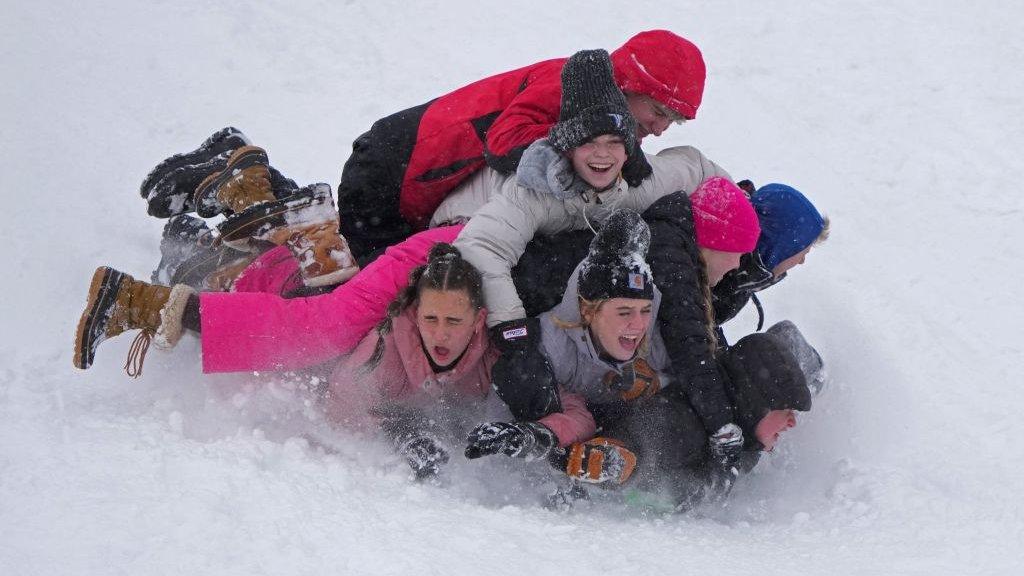Winter storm: What you need to know about this week's wild US weather
- Published
Weather contrasts across North America
A massive winter storm will blanket US cities from coast to coast this week, even as it will feel like early summer in other parts of the country.
More than 30 million people in 22 states were under winter weather alerts as of Tuesday, bracing for a mix of heavy snow, rain and wind.
The National Weather Service (NWS) has warned the storm will be "extremely disruptive" to those in affected areas.
But unseasonably warm conditions are forecast for millions more Americans.
The NWS expects widespread travel disruptions in storm affected regions. Delta, Southwest, and United Airlines said any additional fees will be waived for travellers who may need to rebook flights in certain areas due to bad weather.
Here's what you need to know:
Rare snowfall in California
Winter weather alerts extend from California to Maine, with some areas expecting up to three feet (91cm) of snow.
Rain, snow and strong winds in the northwest are now spreading south and east, and could include Los Angeles and parts of southwest California.
David Swain, a climate scientist at the University of California-Los Angeles, wrote on Twitter that nearly the state's entire population "will be able to see snow from some vantage point later this week".
Gale-force winds carrying extremely cold air are expected in the state through Wednesday, and high surf may create dangerous conditions along the coast through Thursday.
A rare forecast of graupel - snow pellets that resemble soft hail - has also been made in elevated parts of the state.
LA will experience "the coldest storm of the season, and possibly of the last several years," according to its local NWS office.
The city has urged residents to stay indoors and keep warm because it anticipates wind chill temperatures may be below freezing.
Historic blizzard in Minnesota
Minneapolis faces the likelihood of one of the city's top three snowfall events of all time.
As the storm sweeps east and intensifies, it will dump snow at a rate of up to two inches (5cm) per hour and Minnesota may receive as much as 25 inches (64cm) of snowfall through Thursday.
With high wind gusts also predicted, the weather service in the Minneapolis-Twin Cities area has warned of "life-threatening travel disruptions" as well as potential power outages and tree damage.
"Travel by vehicle is not advised and should be avoided," said the local NWS office. "Travel should be restricted to emergencies only."
Blizzard warnings have also been issued in portions of Wyoming, Montana, South Dakota and Iowa.
Icy roads are a concern in other parts of the country too, with freezing rain and severe thunderstorms predicted from Oklahoma to Ohio.

Ice-cream weather for many in the month of February in Manhattan, New York
Record highs and record lows
Temperatures will hit record highs for the month of February in hundreds of US cities across the central and eastern US.
Cities like Atlanta, Georgia and Nashville, Tennessee will see temperatures reach about 77F (25C) by Thursday, while cities in Florida could hit peaks above 86F (30C) - usually not seen until May or June.
Other parts of the country will simultaneously face record lows, with temperature readings five degrees colder than average in parts of Montana, Wyoming and Nebraska.
Forecasters say this pattern of "anomalous weather" is expected to remain in place for at least the next few weeks.
North America typically faces dynamic jet stream patterns during the winter that create a battleground of cold and warm air, but jet streams have been "more extreme" this time, according to climate scientist Andrew Kruczkiewicz, a researcher at Columbia University.
They have been accompanied by ample moisture coming in from the Pacific Ocean and the Gulf of Mexico, he said.
"All winter, we've seen this persistent pattern, where the western US is seeing below-average temperatures and the eastern US is seeing above-average temperatures," he told the BBC.
"What makes this week different is that we're seeing an intensification of the pattern."
Extreme weather events - and their growing intensity around the globe - have been linked to the impacts of climate change.
Related topics
- Published23 February 2023


